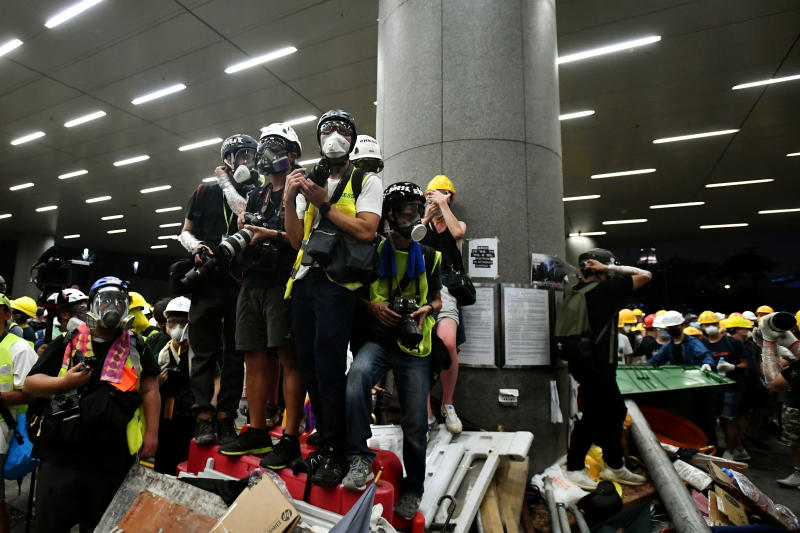Hong Kong broadcaster TVB accused of pro-Beijing bias in protest coverage
Sign up now: Get insights on Asia's fast-moving developments

Members of media among the protesters outside the Legislative Council complex, on July 1, 2019.
ST PHOTO: LIM YAOHUI
HONG KONG (BLOOMBERG) - TVB, Hong Kong's dominant broadcaster, has come under attack on social media for its alleged pro-Beijing bias in the coverage of recent political protests in the city, with campaigners urging companies to pull their commercials.
Organisers of the drive have managed to score at least one win.
Sports drink brand Pocari Sweat, owned by Japanese healthcare company Otsuka Pharmaceutical Co, said it has withdrawn its advertisement from the channel, making it an instant favourite of protesters.
A spokesman for Otsuka said a "periodic review of the advertising budget" and an assessment of the "sales impacts from use of different media outlets" weighed on its decision to pull commercials from TVB.
A representative for TVB didn't immediately respond to an e-mail and phone calls seeking comments.
Shares of the broadcaster fell 0.8 per cent as of 2.37pm on Wednesday (July 10). The stock has dropped 45 per cent in the past year, while the benchmark Hang Seng Index slipped 1.8 per cent.
The campaign against TVB is the latest episode in an unprecedented wave of unrest in the city, as hundreds of thousands hit the streets in the past month demanding protection for personal freedoms in the former British colony now in the shadow of communist China.
The protests, triggered by a proposed Bill that would for the first time allow extraditions to the mainland, have turned violent at times - including last week's ransacking of the legislature.
Bowing to the demonstrators, Chief Executive Carrie Lam came close to admitting defeat this week by calling the controversial legislation "dead".
But, her refusal to formally withdraw the legislation has provided a new rallying point for the movement. The Bill has also helped unify the city's once-fractured opposition.
When Britain handed over Hong Kong to China in 1997, the Asian giant promised the city a "high degree of autonomy" for 50 years, including guarantees of free speech, capitalist markets and English common law under a "one country, two systems" arrangement.
Some residents say China has been slowly chipping away at its autonomy even before the full integration.


